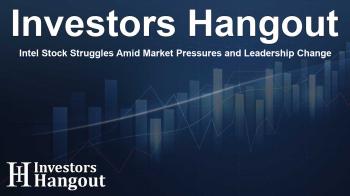Intel Stock Struggles Amid Market Pressures and Leadership Change

Intel Faces Challenges in Semiconductor Market
Intel Corp. INTC has garnered attention due to its significant drop in stock value, which has decreased over 58% in the past year. As the company grapples with this downturn, Citi Research analyst Christopher Danely has highlighted the tech giant's priorities moving forward, emphasizing its commitment to artificial intelligence, addressing CPU manufacturing challenges, and the imperative search for a new CEO.
Leadership Changes at Intel
David Zinsner and Michelle Johnston Holthaus currently serve as the interim co-CEOs at Intel, a change that took place recently as the company seeks to find a permanent leader. This shift follows the retirement of Pat Gelsinger, who led the company for over 40 years. This transition in leadership is critical as Intel aims to redefine its strategy and regain market confidence.
Strategic Focus for 2025
Citi Research’s latest note outlines Intel's key strategic objectives for the near future. The emphasis lies in fixing the product roadmap while resolving longstanding CPU manufacturing issues. Furthermore, Intel is keen on establishing a significant presence within the artificial intelligence sector, which is increasingly crucial in the tech industry.
Market Position and Key Competitors
You can’t discuss Intel without mentioning the competitive landscape it operates within. Currently valued at approximately $85.7 billion, Intel lags behind its rivals. For instance, Qualcomm Inc. QCOM boasts a market capitalization of around $176.7 billion, while Advanced Micro Devices Inc. AMD surpasses Intel with a market cap exceeding $197.7 billion. Perhaps the most staggering comparison comes from Nvidia Corp. NVDA, which leads the pack with a market valuation of $3.43 trillion.
Performance Issues
Despite its standing as a formidable player in semiconductor production, Intel has faced numerous hurdles, particularly concerning the performance of its latest generation processors. Reports indicate persistent issues related to the 13th and 14th generation CPUs, which have drawn criticism from industry experts and consumers alike. In an effort to streamline operations and manage costs amidst these performance challenges, Intel has announced cuts to its workforce, indicating a reduction of around 15,000 jobs, despite previous financial support from government grants.
Price Actions and Analyst Insights
Recent stock trading indicates continued volatility for Intel, with its shares dipping by 0.4% in premarket trading. The stock has seen a decline of approximately 43% over the preceding six months and over 58% year-over-year. Comparative performance shows that the Nasdaq 100 index has managed to rise by around 2.5% in the last six months and 26% over the past year, highlighting Intel’s struggles in contrast.
Analyst Ratings
With market speculation swirling, analysts remain cautious regarding Intel’s outlook. Current consensus ratings, tracked among 31 analysts, lean toward a "sell" recommendation, with an average price target hovering around $30.23, although more recent assessments from BofA Securities, Northland Capital Markets, and Mizuho suggest higher price targets above the current valuations. These ratings reflect both optimism for recovery and recognition of the challenges ahead for the company.
Conclusion
The road ahead for Intel is laden with challenges, yet also ripe with opportunity. As the company undertakes major leadership transitions and aims to stabilize its market presence amidst fierce competition, stakeholders are closely monitoring its next moves. With a focus on innovation and addressing pressing operational issues, Intel hopes to reclaim its status as a leading force in the semiconductor arena.
Frequently Asked Questions
What is Intel's recent stock performance?
Intel's stock has declined over 58% in the past year, reflecting significant market challenges.
Who are the current leaders at Intel?
David Zinsner and Michelle Johnston Holthaus are the interim co-CEOs while the company searches for a permanent replacement.
What are Intel's priorities for the next few years?
Intel is focusing on artificial intelligence, enhancing CPU manufacturing, and stabilizing its operational structure.
How does Intel compare to its competitors?
Intel's market capitalization significantly lags behind companies like Qualcomm, AMD, and Nvidia, indicating its competitive struggles.
What is the sentiment among analysts regarding Intel's future?
Analysts generally hold a cautious stance, with a consensus rating leaning toward selling, although some maintain optimism about potential recovery.
About Investors Hangout
Investors Hangout is a leading online stock forum for financial discussion and learning, offering a wide range of free tools and resources. It draws in traders of all levels, who exchange market knowledge, investigate trading tactics, and keep an eye on industry developments in real time. Featuring financial articles, stock message boards, quotes, charts, company profiles, and live news updates. Through cooperative learning and a wealth of informational resources, it helps users from novices creating their first portfolios to experts honing their techniques. Join Investors Hangout today: https://investorshangout.com/
Disclaimer: The content of this article is solely for general informational purposes only; it does not represent legal, financial, or investment advice. Investors Hangout does not offer financial advice; the author is not a licensed financial advisor. Consult a qualified advisor before making any financial or investment decisions based on this article. The author's interpretation of publicly available data presented here; as a result, they should not be taken as advice to purchase, sell, or hold any securities mentioned or any other investments. If any of the material offered here is inaccurate, please contact us for corrections.
